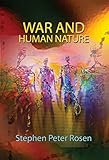War and Human Nature / Stephen Peter Rosen.
Material type: TextPublisher: Princeton, NJ : Princeton University Press, [2009]Copyright date: ©2004Edition: Course BookDescription: 1 online resource (224 p.)Content type:
TextPublisher: Princeton, NJ : Princeton University Press, [2009]Copyright date: ©2004Edition: Course BookDescription: 1 online resource (224 p.)Content type: - 9780691130569
- 9781400826360
- 355.02
- B105
- online - DeGruyter
- Issued also in print.
| Item type | Current library | Call number | URL | Status | Notes | Barcode | |
|---|---|---|---|---|---|---|---|
 eBook
eBook
|
Biblioteca "Angelicum" Pont. Univ. S.Tommaso d'Aquino Nuvola online | online - DeGruyter (Browse shelf(Opens below)) | Online access | Not for loan (Accesso limitato) | Accesso per gli utenti autorizzati / Access for authorized users | (dgr)9781400826360 |
Frontmatter -- Contents -- Acknowledgments -- Chapter 1. Introduction -- Chapter 2. Emotions, Memory, and Decision Making -- Chapter 3. Status, Testosterone, and Dominance -- Chapter 4. Stress, Distress, and War Termination -- Chapter 5. Of Time, Testosterone, and Tyrants -- Chapter 6. Where Do We Go from Here? -- Notes -- Index
restricted access online access with authorization star
http://purl.org/coar/access_right/c_16ec
Why did President John F. Kennedy choose a strategy of confrontation during the Cuban missile crisis even though his secretary of defense stated that the presence of missiles in Cuba made no difference? Why did large numbers of Iraqi troops surrender during the Gulf War even though they had been ordered to fight and were capable of doing so? Why did Hitler declare war on the United States knowing full well the power of that country? War and Human Nature argues that new findings about the way humans are shaped by their inherited biology may help provide answers to such questions. This seminal work by former Defense Department official Stephen Peter Rosen contends that human evolutionary history has affected the way we process the information we use to make decisions. The result is that human choices and calculations may be very different from those predicted by standard models of rational behavior. This notion is particularly true in the area of war and peace, Rosen contends. Human emotional arousal affects how people learn the lessons of history. For example, stress and distress influence people's views of the future, and testosterone levels play a role in human social conflict. This thought-provoking and timely work explores the mind that has emerged from the biological sciences over the last generation. In doing so, it helps shed new light on many persistent puzzles in the study of war.
Issued also in print.
Mode of access: Internet via World Wide Web.
In English.
Description based on online resource; title from PDF title page (publisher's Web site, viewed 30. Aug 2021)


